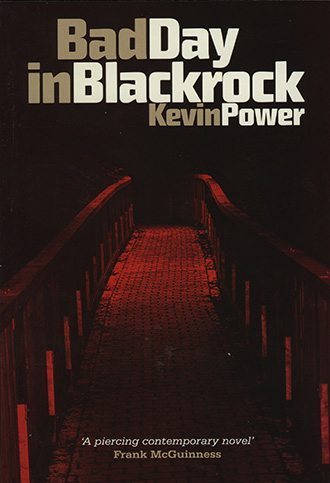
Bad Day In Blackrock
By: Kevin Power
Publication Date: October 2008
€10.00
Bad Day in Blackrock was winner of the Rooney Prize for Irish Literature, 2009.
Adapted for Film as What Richard Did (2012) by Lenny Abrahamson.
On a late August night a young man is kicked to death outside a Dublin nightclub. Celebration turns to devastation. The reverberations of that event, its genesis and aftermath, is the subject of this extraordinary story. The novel strips away the veneer of a generation of Celtic cubs, whose social and sexual mores are chronicled and dissected in this tract for our times. The victim, Conor Harris, his killers – three of them are charged with manslaughter – and the trial judge share common childhoods and schooling in the privileged echelons of South Dublin suburbia. The intertwining of these lives leaves their afflicted families in moral free fall as public exposure merges with private anguish and imploded futures.
This stark, elliptical tale tells of catharsis and self-examination through the eyes of the narrator and Laura Haines, girlfriend, confidante and catalyst. Akin to Lionel Shriver’s We Need to Talk About Kevin, John Banville’s The Book of Evidence and Truman Capote’s In Cold Blood, it deals with the unacceptable, and the nature of truth. Like all good fiction, it illuminates a society and transcends its age with the searchlight of a sympathetic imagination. Bad Day In Blackrock is a significant debut by an intuitive writer.
“Kevin Power is an author of magnificent control, stirring the deepest compassion with restless anger in this piercing contemporary novel.” – Frank McGuinness
“It’s an excellent novel, there’s no two ways about that. It comes from the gut, it’s raw, it’s passionate … a compulsive read.” – John Boyne, The Irish Times
“This is a disturbing book and a truly fine one, when was the last time an Irish novel made us properly uncomfortable? This novel marks the debut of a deeply moral and probing writer – and a potentially great one.” – Dermot Bolger, Sunday Business Post
“A powerful debut and one of the most exciting Irish novels in years.” – Peter Murphy, Hot Press
ABOUT THE AUTHOR
Kevin Power is a writer and critic. He was born in 1981 and attended University College Dublin where he received his BA in 2002 and his MA in 2003. His novel Bad Day in Blackrock was published by The Lilliput Press, Dublin, in 2008 and filmed in 2012 as What Richard Did, adapted by Lenny Abrahamson, and picked up five awards at the Irish Film and Television Awards. Power has been the recipient of many prizes including the Hennessy XO Award for Emerging Fiction, the Rooney Prize for Irish Literature and was Creative Writing Fellow at St Patrick’s college from 2014-2016. His writing has featured in various publications such as The Stinging Fly, The Dublin Review, New Irish Short Stories (2011), Los Angeles Review of Books, The Irish Times, Literary Review, Irish Journal of American Studies, Foundation: The International Review of Science Fiction, and The Dublin Review of Books. He writes regularly for The Sunday Business Post. In 2013 he completed a PhD in American Literature and went on to become an Assistant Professor in the School of English at Dublin City University from 2017-2018. He currently teaches on the MPhil in Creative Writing at Trinity College Dublin and his current research focuses on the fields of 20th and 21st century American literature and film, contemporary Irish literature, and science fiction.
In 2021, Power released White City, his muchanticipated second novel, to wide acclaim.
His latest book is The Written World: Essays & Reviews (2022) – his first non-fiction book.
| ISBN | 9781843511465 |
|---|
| Weight | 0.5 kg |
|---|---|
| Dimensions | 215 × 136 mm |
| Publication Date | October 2008 |
| Format | Paperback, 235pp |

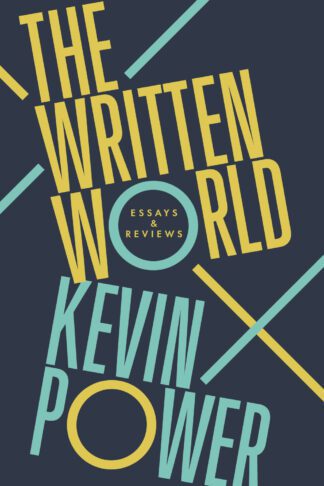
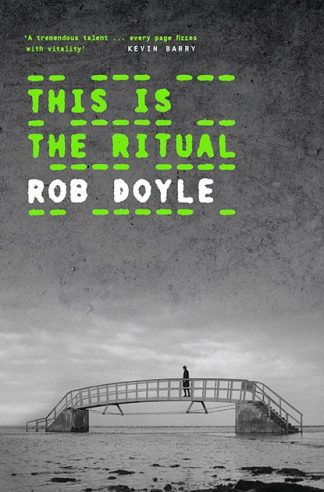
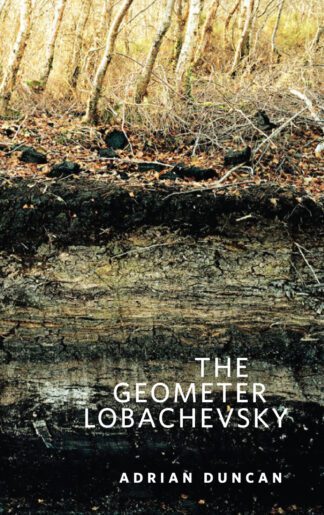
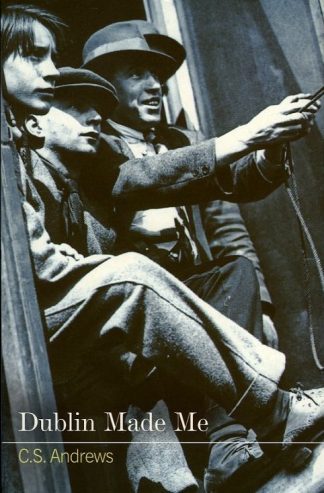
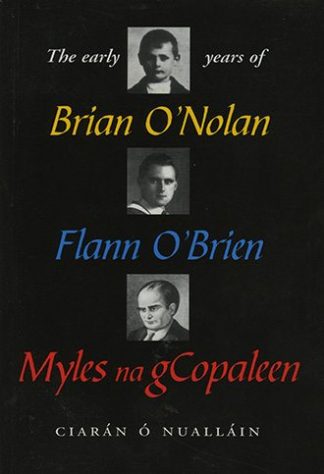
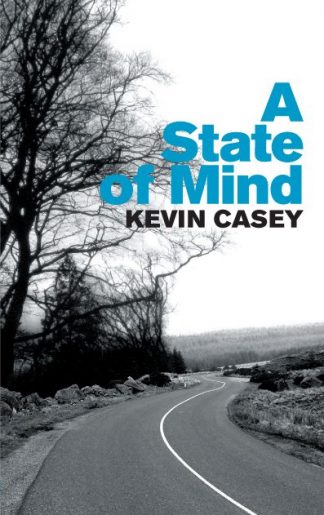
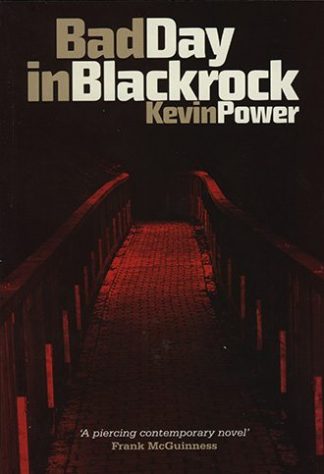
Lilliput Press –
“Hardly a Dubliner was not fascinated by the true life events on which this book is based. The material was ready-made for an excellent novel that could capture the zeitgeist of the Celtic Tiger and kudos to Kevin Power for pouncing on this opportunity. It could have been a tacky take that did nothing but rehash many of the sensational newspaper articles that came out at that time but thankfully the author avoided this pitfall and this novel did not disappoint. It is well-written, surprisingly sympathetic when it could have been a complete hatchet job, yet still driving the point home in the end about the moral hypocrisy of this social set. Impressive from such a young writer and of potential interest universally – not just to Dubliners.
If there’s a second edition of this though there are some irritating and sloppy mistakes that need to be cleaned up and should have been spotted by the editors. The Irish Sea is referred to as ‘the ocean’ by the narrator at one point, the victim’s mother’s name is given incorrectly during the courtroom sentencing scene, and at one point in the book one of the characters gets angry with his college friend for sleeping in his parents’ bedroom in their holiday home, worrying because they would be coming down the following weekend, when a few chapters earlier (and a few years earlier in the characters’ lives) much is made of the fact that this character’s mother died when he was 13. These problems, though small, should be corrected and ironed out as they distract and detract from what is otherwise a gripping and well-written tale.” NOC
Lilliput Press –
“Kevin Power has written a book that is in some ways very similar to the ‘Ross O-Carroll Kelly’series. However, whereas Paul Howard’s ‘ROCK’ books are a satire ‘Bad Day in Blackrock’ is a more serious and poignant look at the same subject. The rugby, the jocks and the Abercrombie-wearing girls are are still here but their actions and motivations are articulately woven in with a social commentary on growing up in Celtic Tiger Ireland when money suddenly flooded the homes of south Dublin’s new elite. Like the ‘ROCK’ books ‘Bad Day’has echoes of Brett Easton Ellis as it decribes a generation that has been handed everything yet has become more vacant and somehow less human in doing so. Although they’re mainly Cathlics, materialism has become the new religion with shopping trips to London, home swimming pools and 100+ haircuts in boutiques (even for the boys). All the while glory on the rugby pitch remains the last bastion of honesty and nobility but only becasue it’s the only thing whereby they have to genuinely work hard for their success.
When I immediately finished it I was admittedly a little disappointed because the story lacks any real resolution. However you’re told this will be the case right from the start when the author tells you the outcome of the trial. Thus I realised it’s not about what happens it’s about what happened and why and when it comes down to it there really is no why. The event was merely a product of the empty society which we seem to have become, one that cannot offer deeper explanantions for its actions.
An absolute must read if you’ve grown up or lived in Dublin since the mid-90’s although it’s so well-written you’ll enjoy even if you’ve never been to Ireland.” BEN T
Lilliput Press –
“”Bad Day in Blackrock” has recently attracted attention again, because it’s inspired the storyline for the new Irish movie, “What Richard Did.” Based on a real case that shocked Ireland earlier in the decade when a wealthy young Irish teenager was accidentally killed in a brawl outside a Dublin night-club, “Bad Day in Blackrock” is a harrowing, gripping and illuminating look into the underbelly of Ireland’s so-called ‘Celtic Tiger.’
Part of what gives “Bad Day in Blackrock” its punch is that everyone in it, from the judge to Conor’s killer and Conor himself, all came from the same socio-economic background. All of them were born, raised and educated in south Dublin’s affluent (good and, more often, bad) and it’s true that nearly all cities have areas like south Dublin’s, which makes it relatable to. This world of upper-middle-class privilege and opportunity has only been increased by Ireland’s economic miracle, which was in full throws at the time “Bad Day in Blackrock” was written. As cynical as it sounds, had Conor Harris been killed by three working class boys, this would have been a very different story and the media would have had a field day discussing how “chav” culture had run amok in modern Ireland. As it was, Conor’s killers were three boys very like himself, who were all very drunk, out for a night out with their friends and who decided to show off in a fit of bravado and accidentally ended up taking another human’s life.
“Bad Day in Blackrock” is about much, much more than the character of Conor Harris’s death. It’s a harrowing look at the only-slightly-fictionalized actions of three boys who are so like three boys a lot of us know. It’s about class, personal responsibility, mistakes and it’s one of those books that stays with you. I found myself thinking about it, with morbid fascination, long after I’d finished reading it.” SARAH
Lilliput Press –
“This is the first novel from young Irish writer Kevin Power. It is a very studied, and fascinating study into the Dublin elite, into the rarefied world of rugby clubs, private schools, the old boys network, and the feeling of invincibility that young people from such backgrounds possess.
The story concerns the death of one of their own, the university student Conor Harris, who is beaten to a pulp outside a Dublin nightclub one barmy August evening. The shock it however, that it is three of his own friends who do the beating, or in this case, the kicking in the head. Power tells the story through the eyes of a narrator, who has observed the goings on of the group at a distance for some time, and who gradually pieces together in his mind the possible reasons and causes of this tragedy.
Alongside the explanation of the friendships, often built on nothing more than mutual backslapping and adoration of the trappings of their wealth, there is a beautiful young woman entangled in the tragedy. Laura Haines was the girlfriend of Conor, but is now going out with Richard Culhane, one of the most beautiful creatures on the earth, a fact that he is well aware of. Culhane is one of the three students who are involved in the fracas that results in Conor’s death, some suspect that is was he who delivered the final fatal kick to the head. And Richard saw Laura talking to Laura shortly before the incident.
The story also shows us how the families of all the students are affected by the tragedy. They are affected so profoundly that their lives will never be the same again. The things which they took for granted have been snatched away with three kicks to the head.
This is much more than a simple love rivalry. Power has fantastic powers of observational writing. He lets us into a world that we are not part of. The writing is taut, and very, very addictive. This is a great first novel from a talented young author that is sure to become a book club favourite.” JULIA C
Lilliput Press –
“I had not heard of the real-life killing upon which this 2008 debut novel is based. A young man from a privileged background, Conor Harris, is kicked to death in a fight with a group of his peers outside a Dublin nightclub. The events leading up to this killing and its consequences are told by a narrator, whose identity is revealed only at the end of the book, from the perspectives of those involved, their friends and families.
The narrator emphasises that not all the truth of what happened have emerged in the police investigation and laces his text with ‘maybes’, ‘mights’ and ‘perhapses’ which I found initially frustrating. The author’s style, using short repetitive sentences is rather disruptive. Thus we have ‘the much repeated Bang. Bang. Bang’ describing the three kicks that kill are assumed to have killed Connor. Describing the parents of the three boys accused of the killing, Power writes ‘They knew people at the Irish Times and the Evening Herald. They knew people at Deloitte & Touche and they knew people at Microsoft. They knew people at Intel and Lucent Technologies and Independent News and Media. They knew people at Trinity and UCD.’
Whilst the killing is at the centre of the story, the author is equally concerned to explore privilege and the ways that this can subvert the rule of law and the equitable machinery of society. The boys at the centre of the story, who attend the exclusive Blackrock College, feel protected by the contacts of their South Dublin families. Power is very good at describing the lifestyles of this clique in the period of the killing, 2004, when the Irish economy was booming.
These are young people behaving badly because their schools, their parents and society have told them implicitly or explicitly that they can. However, they are not children. The pent-up violence the boys release, accentuated by a night’s hard drinking, is linked to their rugby successes, when they ‘took the first running kick as though aiming for the conversion in a senior cup final’. Their sporting successes created opportunities to move seamlessly from college to university and attracted female students from the same social background, with €249 Ugg boots and designer sunglasses, as well as teenage groupies, fuelled by booze, who see these young men as gods.
The dialogue between the characters is very convincing, their topics of conversation – sport, education and careers, fashions and the cost of ‘essential’ items – always reveal the bubble within their lives are lived. The ambivalent roles of the establishment, colleges and church, are deftly drawn and Power describes the wider social comment on the case obliquely through newspaper headlines and TV coverage. The police investigation is earnest and thorough, and the realisation of the three suspects once they are arrested that life will never be the same again gains impact through understatement. One of them thinks ‘When he turned sixty-five he would still be the boy who killed Conor Harris. When he shuffled into the nursing home, he would still be the boy who killed Conor Harris. When he died himself – he increasingly felt – he would just be catching up.’
The novel’s title refers to a newspaper headline and related back to Spencer Tracey’s great film ‘Bad Day at Blackrock’ from 1955. What initially struck me as a rather unstructured collection of anecdotes and attempted reconstructions gradually crystallised through the undoubted skill of the author, although questions remain as to the reliability of the narrator. Half way through I would have scored this 3* but overall it deserves higher whilst leaving a distinctly unpleasant feeling in my mind.
Power was at university with school friends of those accused of involvement in the killing that took place in 2000. Given the time taken for the police investigation, the trial, appeals and time served in prison, the book’s publication must have caused great upset to the family of the dead boy at exactly the time that they were trying to move on. Such apparent insensitivity to the situation of the bereaved should not be part of a book review. However, I found it difficult to separate the two. At least the narrator admits ‘My motives in telling [the story] have been purely selfish, and have had nothing much to do with propriety or with the need for good manners.’” DR R
Lilliput Press –
“I loved this book and took me back to my boarding school days, easy reading and well written. Enjoyable storyline” JAN FLEMING
Lilliput Press –
“I found portions of this book very hard to read – some of the descriptions of the central incident are so graphic as to be thoroughly unsettling. I liked the writing very much – Kevin Power gets inside the characters’ heads very effectively and produces a taut account of a rarified group of young people with everything going for them, who threw it away in a drunken brawl. The close similarities of the plot to a real-life case in Ireland make it the more difficult to read, but this is a powerful novel and well worth the price.” PETRA WIMSEY
Lilliput Press –
“It was a good day in Harold’s Cross(where I live) when I read it. Liked it because of it’s mean style with not a word our of place. It reminded me of Capote’s “In Cold Blood”, viz., killing(s) based on fact and in a ‘journalistic’ style. Although the reader knows the outcome and the narrator knows it also the narrative still manages to create an investigative/detective atmosphere. The author needs to find another subject soon before he’s forgotten by a fickle reading public always looking for something more…” IVOR FAULKNER